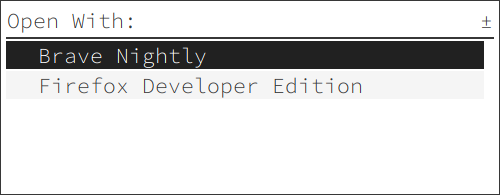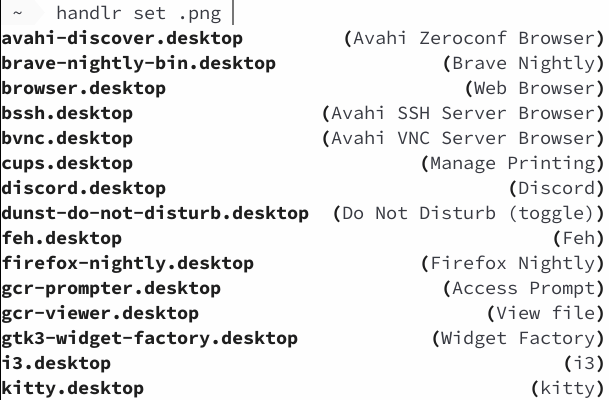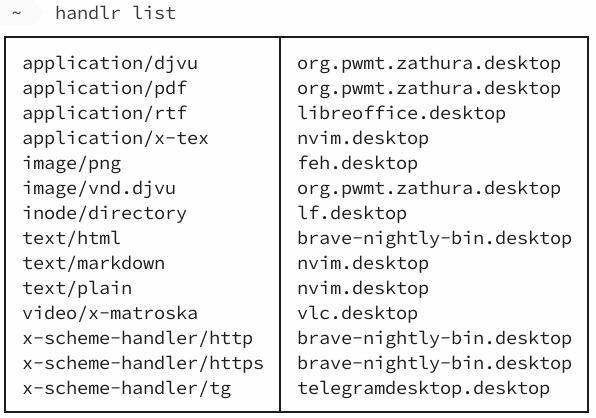17 unstable releases (4 breaking)
| 0.6.4 | Apr 30, 2021 |
|---|---|
| 0.6.3 | Apr 25, 2021 |
| 0.5.0 | Dec 19, 2020 |
| 0.4.5 | Jun 21, 2020 |
| 0.2.1 | May 18, 2020 |
#4 in #dmenu
46 downloads per month
39KB
942 lines

handlr
Manage your default applications with ease using handlr!
Features
- Set default handler by extension or mime-type
- Intelligent mime type detection from files based on extension and content
- Open multiple files at once
- Set multiple handlers for mime/extension and use
rofi/dmenuto pick one - Wildcard support like
text/* - Automatically removes invalid/wrong
.desktopentries frommimeapps.list - Helper commands like
launch,get --jsonfor your scripting needs - Unnecessarily fast (written in Rust)
- Single compiled binary with no dependencies
Usage
# Open a file/URL
handlr open ~/.dotfiles/pacman/packages.txt
handlr open https://google.ca
# Set default handler for png files
handlr set .png feh.desktop
# Set wildcard handler for all text files
handlr set 'text/*' nvim.desktop
# Set default handler based on mime
handlr set application/pdf evince.desktop
# List default apps
handlr list
# Get the handler for a mime/extension
$ handlr get .png
feh.desktop
# Launch a handler with given path/URL
handlr launch x-scheme-handler/https -- https://google.ca
Compared to xdg-utils
- Can open multiple files/URLs at once
- Can have multiple handlers and use rofi/dmenu to pick one at runtime
- Far easier to use with simple commands like
get,set,list - Can operate on extensions, no need to look up or remember mime types
- useful for common tasks like setting a handler for png/docx/etc files
- Superb autocomplete (currently just fish), including mimes, extensions, and
.desktopfiles - Optional json output for scripting
- Properly supports
Terminal=trueentries
Setting default terminal
Unfortunately, there isn't an XDG spec and thus a standardized way for handlr to get your default terminal emulator to run Terminal=true desktop entries. There was a proposal floating around a few years ago to use x-scheme-handler/terminal for this purpose. It seems to me the least worst option, compared to handling quirks of N+1 distros or using a handlr-specific config option.
Now if x-scheme-handler/terminal is present, handlr will use it.
Otherwise, handlr will:
- Find an app with
TerminalEmulatorcategory - Set it as the default for
x-scheme-handler/terminal - Send you a notification to let you know it guessed your terminal and provide instructions to change it if necessary
On the upside, Terminal=true entries will now work outside of interactive terminals, unlike xdg-utils.
Setting multiple handlers
-
Open
~/.config/handlr/handlr.tomland setenable_selector = true. Optionally, you can also tweak theselectorto your selector command (using e.g. rofi or dmenu). -
Add a second/third/whatever handler using
handlr add, for example
handlr add x-scheme-handler/https firefox-developer-edition.desktop
- Now in this example when you open a URL, you will be prompted to select the desired application.

Screenshots

|

|
Installation
Arch Linux
yay -S handlr-bin
Optionally you can also install xdg-utils-handlr to replace xdg-open:
yay -S xdg-utils-handlr
Rust/Cargo
cargo install handlr
Binaries
- Download the latest release binary and put it somewhere in
$PATH - Download completions:
curl https://raw.githubusercontent.com/chmln/handlr/master/completions/handlr.fish --create-dirs -o ~/.config/fish/completions/handlr.fish
Attribution
Icons made by Eucalyp from www.flaticon.com
Cover photo by creativebloq.com
Dependencies
~8–12MB
~198K SLoC